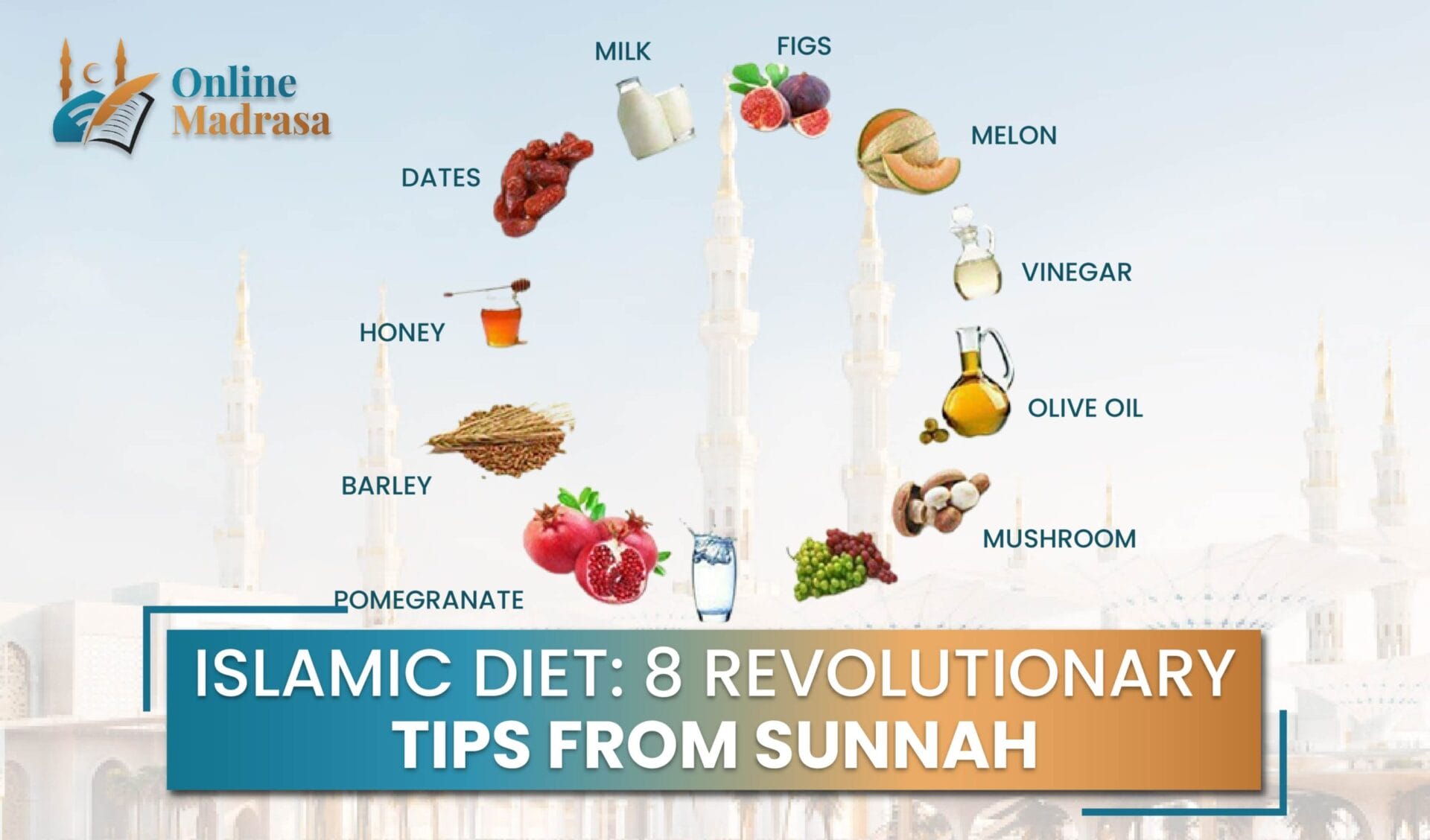Islam Diet -8 Revolutionary Tips from Sunnah

The Sunnah contains guidance for us in every situation we may face. It also guides us about our daily dietary habits, how we should eat, in what quantity and so on. We shall explore the eight significant revolutionary tips from Sunnah about the diet.
Mindful Eating
‘Eat together rather than individually, because the blessing is linked to the company.’ This was addressed by the Prophet (PBUH), and it has since been demonstrated that sharing and enjoying food may relieve stress, strengthen family and marital relationships, and help children develop healthy eating habits.
Family meals allow members of the family to get together, strengthen bonds, and improve relationships. They foster a sense of belonging, which boosts self-esteem. Hence, we should make eating together as a family a priority in our homes.
Consuming Food Slowly
We know that our bodies take 20 minutes to convey messages to our brain indicating that they are full. Slow eating would help you consume less food and enhance your digestion. Prophet Muhammad (PBUH) followed it and greatly supported it.
Slowing down and paying close attention to what we are eating can be a terrific opportunity to practice mindfulness. Instead of hurrying through a meal obsessing about whatever you need to accomplish next, be present in the moment. You should eat when you are hungry. We believe that practicing mindfulness will promote a less stressful existence and long-term happiness.
Slowing down your eating allows you to chew your meal thoroughly. This causes the jaws to work and the saliva to mingle with the meal. As a result, when the food particles are split into smaller pieces, there is less churning in the stomach and intestine, resulting in effective digestion
Eating Less
Prophet Muhammad (PBUH) highlighted the importance of eating less to avoid sickness and disease, which is supported by science today. The Islamic notion of ‘1/3 for food, 1/3 for liquids, and 1/3 for breath’ is extremely similar to the Japanese concept of ‘hara hachi bu,’ which means eat till you are just 80% full.
Eating less means that your body receives less calories. As a result, your overall metabolic rate is enhanced, coupled with decreased fat deposition. You will feel more energized throughout the day, be more attentive, be able to think more clearly, and have a renewed desire to finish the day’s tasks.
Overeating is at the foundation of many of our current problems. In addition, overeating is not just harmful for a person’s physical health; it is also detrimental, if not worse, for his spiritual health and wellness, as well as for his Aakhira.
Nonetheless, we force our children to eat, finish their plates, or simply eat till they are satisfied. And we do the same thing.
What we do not realize is that not only is this bad for our health and goes against our beloved Prophet’s (PBUH) wise teachings, but it is also keeping us from the sincere and concentrated worship of Allah that we seek, that Sakeena, the contentment that should be present in all of our Ibadaat.
Moderation
Islam established the foundation for dietary requirements as well as the boundaries within which Islam encourages man to enjoy life’s pleasures, including food, in moderation, without becoming a slave to his impulses and without losing sight of his spiritual enlightenment purposes.
In all of his concerns, including his eating habits, a Muslim is urged to avoid extremes and to pursue a reasonable approach.
“O children of Adam! Wear your beautiful apparel at every time and place of prayer; eat and drink, but waste not by excess. For Allah loves not the wasters.”
– Al- Qur’an, 7:31
A Prayer Before Each Meal
As eating, like any other act of worship for a Muslim, begins with the name of Allah, you should say Bismillah before starting to eat and recite a supplication.
Muslims should begin their meal with the following supplication:
“O Allah! Bless the food You have bestowed upon us and protect us from the torment of hell. In the name of Allah, we start.”
– An-Nasa’I
When we eat food, the Prophet (PBUH) mentioned in Jami at-Tirmidhi that we should recite Bismillah. If we fail to say it before we eat, we should say ‘Bismillah Fi Awwalihi Wa Akhirih,’ which means in Allah’s name at the beginning and end. We derive advantage from this because Allah blesses the food and keeps shaitaan at bay.
Saying Bismillah has also been shown to have psychological benefits. This is because we remember Allah; as a result, we are reminded of his blessings and that we are nothing without him.
A Prayer at the End of Every Meal
Muslims appreciate and thank Allah for the blessings He has bestowed upon them after finishing their meal. Muslims utter the following supplication after finishing their meal:
“Praise be to Allah the One Who gave us the food and the drinks. Praise be to Him Who made us Muslims.”
– Tirmidhi & Abu Dawud
The Prophet (PBUH) said, “God is pleased when one of His slaves eats something and praises Him for it, or drinks something and praises Him for it.”
Sharing Food
Prophet Muhammad (PBUH) taught to his followers the joys of sharing rather than overindulging in life’s pleasures. It is encouraged that food be shared with neighbors, relatives, friends, the poor, and the homeless. Ibn Abbas (May Allah be pleased with him) claimed to have overheard Allah’s Messenger (PBUH) say:
“He is not a believer who eats to his fill but his neighbor goes without food.”
Sahih Bukhari
The Muslim’s duty to control desire, particularly while eating, was reinforced by Prophet Muhammad (PBUH). This is evident in a case described by Ibn Umar in which the Prophet (PBUH) forbade anyone from taking two dates without first seeking permission from his friends that are present (Sahih Bukhari).
Do not Criticize Food
Regardless of personal dislike, food ought not be ridiculed for any reason. Prophet Muhammad (PBUH) never said anything negative about the meal that was served to him.
“The Prophet (PBUH) never criticized any food (he was invited to) but he used to eat it if he liked the food, and leave it if he disliked it.”
– Sahih Bukhari
This Hadith sheds insight on the Prophet’s great manners, which all Muslims should emulate. It is a sad situation because when we find a meal to be a little off-putting, we lose our composure and make quite a spectacle in the house.
Conclusion
We have found so many revolutionary tips from Sunnah. When accomplished according to Islamic rules, eating, just like every other deed of a Muslim, is a form of worship. May we all follow in the footsteps of our Prophet (PBUH).
